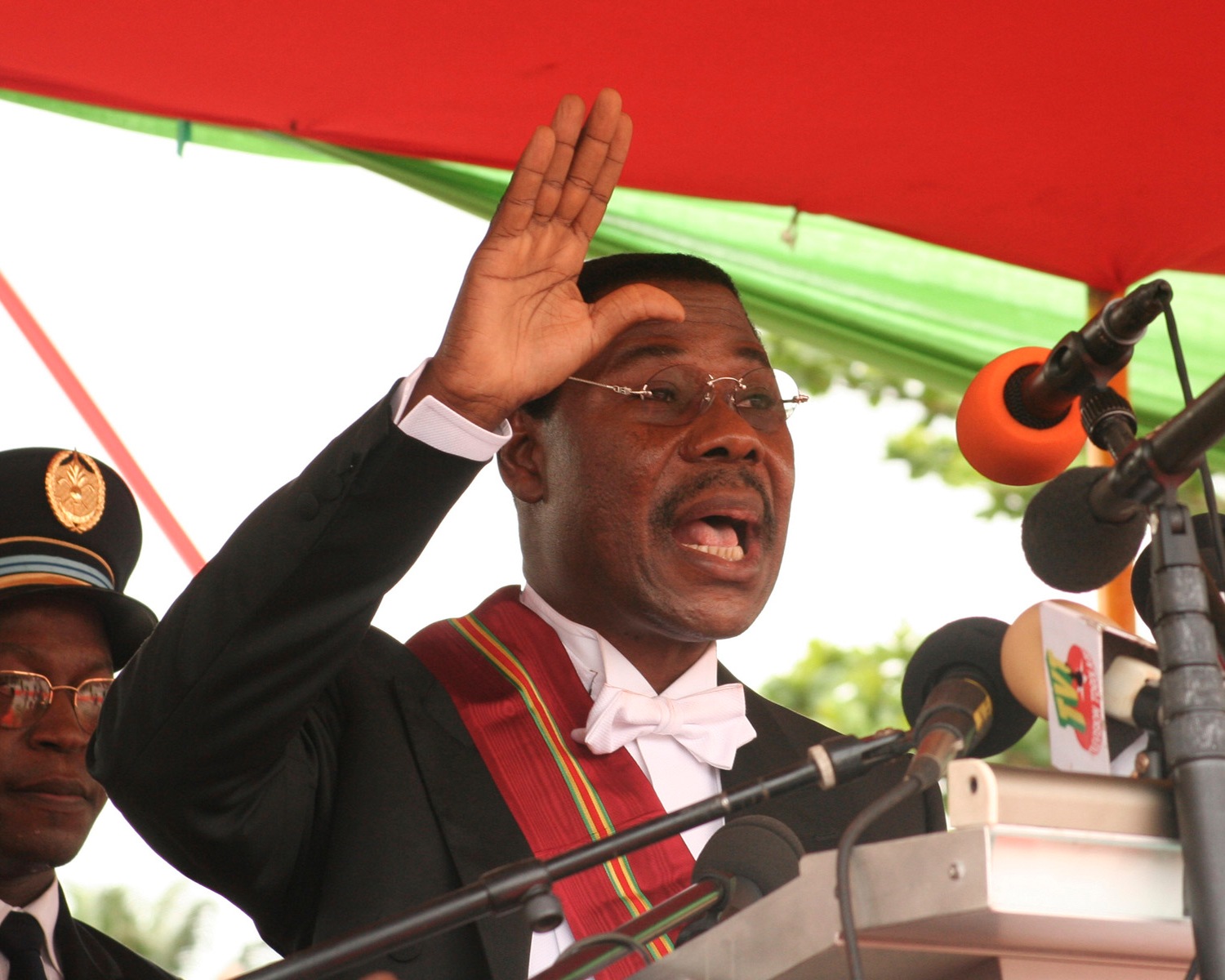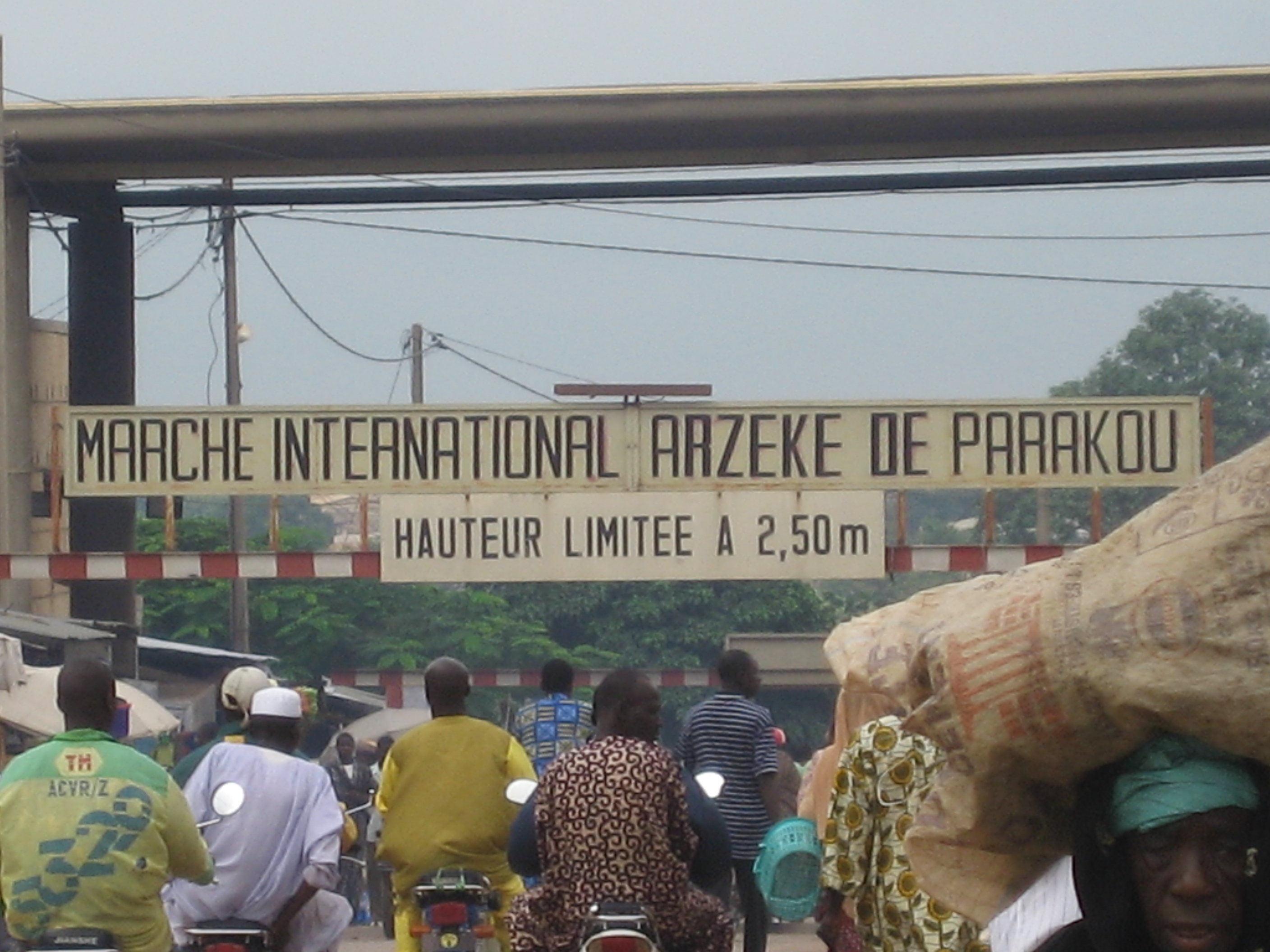|
Thomas Yayi
Thomas Boni Yayi (born 1 July 1951) is a Beninese banker and politician who was President of Benin from 2006 to 2016. He took office after winning the March 2006 presidential election and was re-elected to a second term in March 2011. He also served as the Chairperson of the African Union from 29 January 2012 to 27 January 2013. Early life and banking career Boni was born in Tchaourou, in the Borgou Department in northern Benin, then the French colony of Dahomey. He received his education first in the regional capital of Parakou before moving on to earn a master's degree in economics at the National University of Benin. He then pursued an additional master's degree in economics at the Cheikh Anta Diop University in Dakar, Senegal, and then earned a doctorate in economics and politics at the University of Orléans in France and at Paris Dauphine University, where he completed a doctorate in economics in 1976. At the end of his education, Boni began a long career in bank ... [...More Info...] [...Related Items...] OR: [Wikipedia] [Google] [Baidu] |
President Of Benin
The president of Benin () is both head of state and head of government in Benin. The Cabinet of Benin is under the authority of the President, and serves to advise and help formulate strategies. It also liaises with ministries and other government institutions. A total of seven people have served as President (not counting two acting presidents, several interim military officeholders and a collective presidency). Additionally, one person, Mathieu Kérékou, has served on two non-consecutive occasions. Description of the office Election The President of the Republic shall be elected by direct universal suffrage for a mandate of five years, renewable only one time.Article 42 of the Constitution of 1990. In any case, no one shall be able to exercise more than two presidential mandates. The election of the President of the Republic shall take place with a uninominal majority ballot in two rounds.Article 43 of the Constitution of 1990. No one may be a candidate for the office of P ... [...More Info...] [...Related Items...] OR: [Wikipedia] [Google] [Baidu] |
Democracy In Francophone Africa
Democracy (From grc, δημοκρατία, dēmokratía, ''dēmos'' 'people' and ''kratos'' 'rule') is a form of government in which the people have the authority to deliberate and decide legislation ("direct democracy"), or to choose governing officials to do so ("representative democracy"). Who is considered part of "the people" and how authority is shared among or delegated by the people has changed over time and at different rates in different countries. Features of democracy often include freedom of assembly, association, property rights, freedom of religion and speech, inclusiveness and equality, citizenship, consent of the governed, voting rights, freedom from unwarranted governmental deprivation of the right to life and liberty, and minority rights. The notion of democracy has evolved over time considerably. Throughout history, one can find evidence of direct democracy, in which communities make decisions through popular assembly. Today, the dominant form of democrac ... [...More Info...] [...Related Items...] OR: [Wikipedia] [Google] [Baidu] |
Democratic Renewal Party (Benin)
The Democratic Renewal Party (french: Parti du renouveau démocratique) is a political party of Benin led by Adrien Houngbédji. Houngbédji lived in exile for several years, but returned to Benin to take part in the National Conference of 1990. He built up his party largely around other exiled Beninese. PRD was legally recognized on September 24, 1990. Houngbédji was elected to the National Assembly in the 1991 parliamentary election and served as President of the National Assembly until 1995. In 1996 PRD joined the government, and Houngbédji was appointed Prime Minister. The coalition didn't last, however. Following the 1999 parliamentary election, Houngbédji was again elected as President of the National Assembly. The PRD is mainly based in Ouémé. In the presidential election of 5 March 2006, Houngbédji, the PRD candidate, won 24.2% of the votes in the first round. In the second round he won 25.4% and was defeated by Yayi Boni. Parliamentary election results *1991 - ... [...More Info...] [...Related Items...] OR: [Wikipedia] [Google] [Baidu] |
Adrien Houngbédji
Adrien Houngbédji (born 5 March 1942) is a Beninese politician and the leader of the Democratic Renewal Party (''Parti du renouveau démocratique'', PRD), one of Benin's main political parties. He was President of the National Assembly of Benin from 1991 to 1995, Prime Minister of Benin from 1996 to 1998, and President of the National Assembly again from 1999 to 2003. Beginning in 1991, he stood repeatedly as a presidential candidate; he placed second in 2006, but was heavily defeated by Yayi Boni in a second round of voting. From 2015 to 2019, he served for a third time as President of the National Assembly. Political career Adrien Houngbédji was born in Aplahoué (Benin) in 1942.National Assembly page on Houngbédji , bj.refer.org . He earned a Doctorate in Law from the |
West African Development Bank
The West African Development Bank - WADB (fr. Banque Ouest Africaine de Développement - BOAD / pt. Banco de Desenvolvimento do Oeste Africano - BDOA) is an international Multilateral Development Bank established in 1973 to serve the nations of Francophone and Lusophone West Africa. The BOAD is organised by the Central Bank of West African States and its eight member governments: Benin, Burkina Faso, Guinea Bissau, Côte d'Ivoire, Mali, Niger, Senegal and Togo. It is funded by member states, foreign governments and international agencies. Its headquarters are in Lomé, Togo. Creation The BOAD was created 14 November 1973 by member states of the West African Monetary Union (WAMU). The original charter focused on development of member economies towards balanced development and to prepare economies for future West African economic integration. In 1994, it became the development arm of the West African Economic and Monetary Union (WAEMU/UEMOA). Structure Since that time several ... [...More Info...] [...Related Items...] OR: [Wikipedia] [Google] [Baidu] |
Nicéphore Soglo
Nicéphore Dieudonné Soglo (born November 29, 1934) is a Beninese politician who was Prime Minister of Benin from 1990 to 1991 and President from 1991 to 1996. He was Mayor of Cotonou from 2003 to 2015. Soglo was married to Rosine Vieyra Soglo, the Beninois former First Lady and politician. Biography Soglo was born in French Togoland. He studied law and economics at the University of Paris and the École nationale d'administration. Soglo met his future wife, a Beninese student named Rosine Vieyra, in 1947 while both were studying in France. The couple married on July 2, 1958. They had two sons - Léhady Soglo (born 1960) and Ganiou Soglo (born 1961). After receiving degrees in law and economics from the University of Paris, Soglo returned to Benin (then called Dahomey) and was the inspector of finance (1965–1967) before his cousin, Colonel Christophe Soglo, overthrew President Sourou-Migan Apithy and appointed his relative, Nicéphore, as minister of finance and economic ... [...More Info...] [...Related Items...] OR: [Wikipedia] [Google] [Baidu] |
Central Bank Of West African States
The Central Bank of West African States (french: Banque Centrale des États de l'Afrique de l'Ouest, BCEAO) is a central bank serving the eight west African countries which share the common West African CFA franc currency and comprise the West African Economic and Monetary Union (UEMOA): *Benin *Burkina Faso *Guinea-Bissau * Ivory Coast (Côte d'Ivoire) *Mali *Niger *Senegal *Togo The Bank is active in developing financial inclusion policy and is a member of the Alliance for Financial Inclusion. History Its predecessor, the ("note-issuing institute of French West Africa and Togo"), was created in 1955 and became BCEAO in 1959. The treaty establishing the West African Monetary Union (UMOA), signed on May 12, 1962, gave BCEAO the exclusive right to issue currency as the common central bank for the, then, seven member countries: *Ivory Coast * Dahomey (modern day Benin) * Haute-Volta (modern day Burkina Faso) *Mali *Mauritania *Niger *Senegal On June 30, 1962 Mali left the group ... [...More Info...] [...Related Items...] OR: [Wikipedia] [Google] [Baidu] |
Dakar
Dakar ( ; ; wo, Ndakaaru) (from daqaar ''tamarind''), is the capital and largest city of Senegal. The city of Dakar proper has a population of 1,030,594, whereas the population of the Dakar metropolitan area is estimated at 3.94 million in 2021. The area around Dakar was settled in the 15th century. The Portuguese established a presence on the island of Gorée off the coast of Cap-Vert and used it as a base for the Atlantic slave trade. France took over the island in 1677. Following the abolition of the slave trade and French annexation of the mainland area in the 19th century, Dakar grew into a major regional port and a major city of the French colonial empire. In 1902, Dakar replaced Saint-Louis as the capital of French West Africa. From 1959 to 1960, Dakar was the capital of the short-lived Mali Federation. In 1960, it became the capital of the independent Republic of Senegal. History The Cap-Vert peninsula was settled no later than the 15th century, by the Lebu peop ... [...More Info...] [...Related Items...] OR: [Wikipedia] [Google] [Baidu] |
Parakou
Parakou is the largest city in northern Benin, with an estimated population of around 206,667 people, and capital of the Borgou Department. Administratively the commune of Parakou makes up one of Benin's 77 communes. Since 2015, its mayor is Souradjou Adamou Karimou. History The city was founded in the 16th century by traders. Economy Parakou lies on the main north-south highway RNIE 2 and at the end of a railway to Cotonou. Markets This has made it an important market town, with major industries including cotton and textiles, peanut oil manufacture and brewing. The town grew initially from revenue generated from passing merchants that took goods from the region across the Sahara and the Mediterranean to Europe.Butler, Stuart (2019) ''Bradt Travel Guide - Benin'', pgs. 177-180 Parakou later became well known in the slave trade. Later traders concentrated on cotton and Parakou remains the hub of the Beninese cotton trade to this day, with considerable interest from Europe. T ... [...More Info...] [...Related Items...] OR: [Wikipedia] [Google] [Baidu] |
Borgou Department
Borgou is one of the twelve departments of Benin. Borgou borders the country of Nigeria and the departments of Alibori, Atakora, Collines and Donga. The capital of Borgou is Parakou. The department of Borgou was bifurcated in 1999, with its northern territory transferred to the newly created Alibori Department. According to the 2013 census, the total population of the department was 1,214,249, with 607,013 males and 607,236 females. The proportion of women was 50.00%. The total rural population was 56.40%, while the urban population was 43.60%. The total labour force in the department was 271,652, of which 25.20% were women. The proportion of households with no level of education was 64.30%. Geography Borgou borders Alibori Department to the north, Nigeria to the east, Collines Department to the south, and Donga Department and Atakora Department to the west. Geographically, the department is part of the larger Borgou region artificially dissected by the Benin-Nigeria borde ... [...More Info...] [...Related Items...] OR: [Wikipedia] [Google] [Baidu] |



